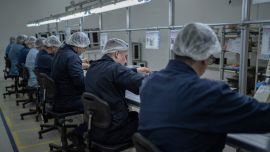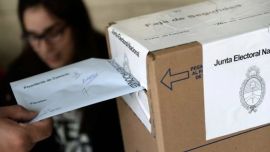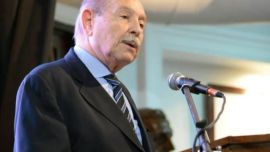It should be relatively obvious to anybody that has bothered to pay attention that the debate regarding the suspension of Argentina’s controversial PASO primaries is dictated by the personal interests of the involved parties. This is particularly evident in the case of the ruling coalition, Frente de Todos, where the major faction that responds to Cristina Fernández de Kirchner is openly in conflict with her hand-picked president, Alberto Fernández. Even in the opposition coalition, Juntos por el Cambio, – where several important leaders starting with the main contender in 2023, Horacio Rodríguez Larreta, have decried the move as an attempt to manipulate the electoral system – intentions are purely pragmatic. Only a few years ago, when Mauricio Macri was president, they tried to eliminate the system themselves only to find they were incapable of doing so, as a video circulated by La Cámpora political youth organisation reminded us this week.
Argentina’s electoral system has included “obligatory” primaries since 2009, a move that was pushed by Fernández de Kirchner’s administration. As usual, the new model was seen by the opposition as an attempt by Néstor Kirchner and his wife to consolidate their power, which in turn strengthened a two-party system that has morphed into “bi-coalitionism” that has dominated Argentine politics, at least over the last two decades. An important element of the new electoral law that was criticised back then by several future allies of the Kirchnerites had to do with excluding parties with less than 1.5 percent of the vote in the PASO primaries from competing in the real elections, meaning it reduced the fragmentation of big parties, which was supposed to benefit the Frente para la Victoria (the coalition led by the Kirchners).
In an interesting turn of fate, it’s Cristina’s closest allies that are now pushing for the permanent elimination of this mechanism. ‘PASO’ refers to primaries that are open, simultaneous and obligatory, meaning that everyone who wants to compete in the actual elections has to participate. In many cases they are held in political spaces that are presenting single candidates, and therefore they have essentially become a national opinion poll held two and a half months before the election. Not only is this incredibly costly, especially in an electoral system that includes a general election every two years (midterms and national), it also dramatically extends the electoral calendar with many of the last presidential elections heading to run-offs, meaning there are three presidential election rounds some years.
Another interesting characteristic of this system is that under certain circumstances it has a tendency to define the election ahead of time. When Mauricio Macri was humiliated by Alberto Fernández and CFK in 2019, the expectation that pan-Peronism would return to power led to an aggressive run on the peso, which in turn exacerbated the economic catastrophe that the Macri administration was already facing. Even though it sprung the centre-right leader’s campaign team into action, allowing him to recover ground in the general election, he had already become a lame duck by August – four months before handing over the presidential regalia to Alberto. Something similar happened to Cristina in the 2017 midterms, where she was unable to overcome a relatively unknown candidate (Esteban Bullrich) in the Senate race in Buenos Aires Province, a Peronist bastion. A technical tie (34.19 percent for Bullrich, 34.11 percent for CFK) led to an absolute feeling of euphoria within the ruling Cambiemos coalition at the time, which ultimately stretched the margin of victory by a few percentage points and led them to believe they had “retired” Fernández de Kirchner from power.
Why is she pushing to get the PASO cancelled, then? And why is President Alberto finally finding the courage to stand up to his political boss at one of his weakest political moments? The idea that the PASO should be eliminated was floated by Interior Minister Eduardo ‘Wado’ de Pedro, the only Kirchnerite in the cabinet, who said every governor opposed them (several provinces have already suspended the primaries). Máximo Kirchner, CFK’s son and a leading deputy within the Peronist ranks, agreed, noting his mum wouldn’t run for president. La Cámpora, the political grouping he leads, surfaced an old video of Macri arguing against the PASO mechanism. Yet Alberto counterpunched, noting the PASO should be maintained and indicating he would run, and that Cristina would be an extremely competitive candidate.
The president is playing his cards knowing he’s got little to lose. He’s also said he would step aside if a better candidate appeared. Not only is he trying to drag Fernández de Kirchner into a battle she doesn’t want to fight, now he’s trolling Economy Minister Sergio Massa, who continues to say he won’t run but is desperate to show some economic improvement that’ll give him a chance. Alberto knows CFK is aware of the prohibitive rejection figures she commands, making her an impossible candidate for a national election, despite handily taking the primaries. Running for the Senate in Buenos Aires Province essentially guarantees her a post, and therefore immunity. Furthermore, eliminating the PASO would allow CFK to play the role of kingmaker once again. Whether it’s just a power play by Alberto Fernández or he actually thinks he could pull off the re-election given the extreme levels of polarisation Argentina is experiencing at present, he’s finally managing to impose some sort of conditions on his coalition colleagues.
In the opposition, Rodríguez Larreta continues to fight a multi-front war against Macri, and the Civic Radical Union (UCR). He has defended the primaries, which did deliver Juntos por el Cambio a positive surprise in the 2021 midterms where it allowed them to defeat the Peronists in the Buenos Aires Province, the mother of all battles. He needs the coalition to remain united but also to lend its support in the national race, which could force him to face-off with the tough Patricia Bullrich, Macri’s placeholder, who could be extremely competitive in a primary. The argument has to do with changing the rules of the game as the match is being played, which in part is true but fails to read the game correctly: Peronists never really cared about the rules. Regardless, a supermajority is needed in both chambers of Congress (129 deputies and 37 senators), something which appears impossible at this juncture.
In Argentina, though, you never know.



















Comments